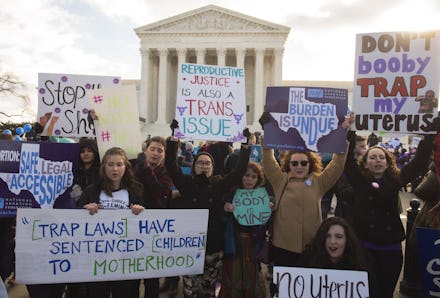Federal appeals court upholds restrictive Louisiana abortion law

A federal appeals court upheld a Louisiana abortion law Wednesday, reversing a previous district court ruling that struck down the law.
Under the Louisiana law, physicians providing abortions must have “active admitting privileges” at a hospital within 30 miles of the abortion clinic. Though a similar law in Texas was struck down by the U.S. Supreme Court in Whole Woman’s Health v. Hellerstedt, the U.S. Court of Appeals for the Fifth Circuit claimed the Louisiana law was valid because it “does not impose a substantial burden on a large fraction of women under WWH and other controlling Supreme Court authority.”
According to the appeals court’s majority decision, the Louisiana law did not impose an “undue burden” on women because “there is no evidence that any of the clinics will close as a result of the act.” There are only two abortion physicians in the state who currently have admitting privileges, but the appeals court predicted that several other physicians without admitting privileges would in fact be able to obtain these privileges, and have rather “largely sat on their hands, assuming that they would not qualify.”
Only one abortion physician would be unable to perform abortions as a result of the law, the ruling claimed, which could affect “at most, only 30% of women.”
“A minimal burden even on a large fraction of women does not undermine the right to abortion,” U.S. Circuit Judge Jerry E. Smith wrote in his ruling.
In his dissent, U.S Circuit Court Judge Patrick E. Higginbotham disagreed with the majority’s opinion, instead projecting that the law could result in the closure of one of Louisiana’s three remaining abortion clinics, prevent three doctors from being able to perform abortions and prevent 5,000 women from obtaining an abortion in Louisiana.
“At the outset, I fail to see how a statute with no medical benefit that is likely to restrict access to abortion can be considered anything but ‘undue,’” Higginbotham wrote in his dissent. “Contrary to the majority’s conclusion, the effect of the act will be to place a substantial obstacle in the path of a woman’s choice.”
In a statement, Louisiana Attorney General Jeff Landry “applaud[ed]” the decision “to allow Louisiana’s pro-life and pro-woman admitting privileges law to go into effect.”
“This has been a long road, but we have always strongly believed Act 620 did not impose a substantial burden on women and that we had evidence to show its benefits,” Landry said.
The Louisiana law is an example of a “TRAP law,” a law that regulates abortion by imposing strict regulations on providers “beyond what is necessary to ensure patients’ safety,” according to the Guttmacher Institute. Laws requiring abortion providers to have relationships with local hospitals “add nothing” to existing patient protections while granting hospitals effective veto power over abortion rights, according to the the Guttmacher Institute.
Per Higginbotham’s dissent, abortion in Louisiana was found to be “extremely safe” without the required hospital admitting privileges. The district court that overturned the law found that hospital transfers for abortion patients — the reason behind requiring hospital admitting privileges — take place “far less than once a year, or less than one per several thousand patients.”
Wednesday’s appeals court ruling marks the latest abortion ruling now one step away from the U.S. Supreme Court — and nominee Brett Kavanaugh, whose Senate confirmation vote is looming, despite a charged and emotional hearing Thursday on allegations of sexual assault.
The Center for Reproductive Rights said in a statement it would “take every legal recourse to ensure that this unconstitutional law does not take effect,” meaning further legal action on the law could be possible.
The Louisiana ruling is one of several abortion decisions that have come out during Kavanaugh’s confirmation process, including a ruling upholding similar TRAP laws in Missouri and an appeals court ruling striking down an Alabama ban on a common abortion procedure. Abortion rights advocates believe that Kavanaugh could provide the fifth vote to weaken abortion rights and potentially overturn Roe v. Wade if confirmed.